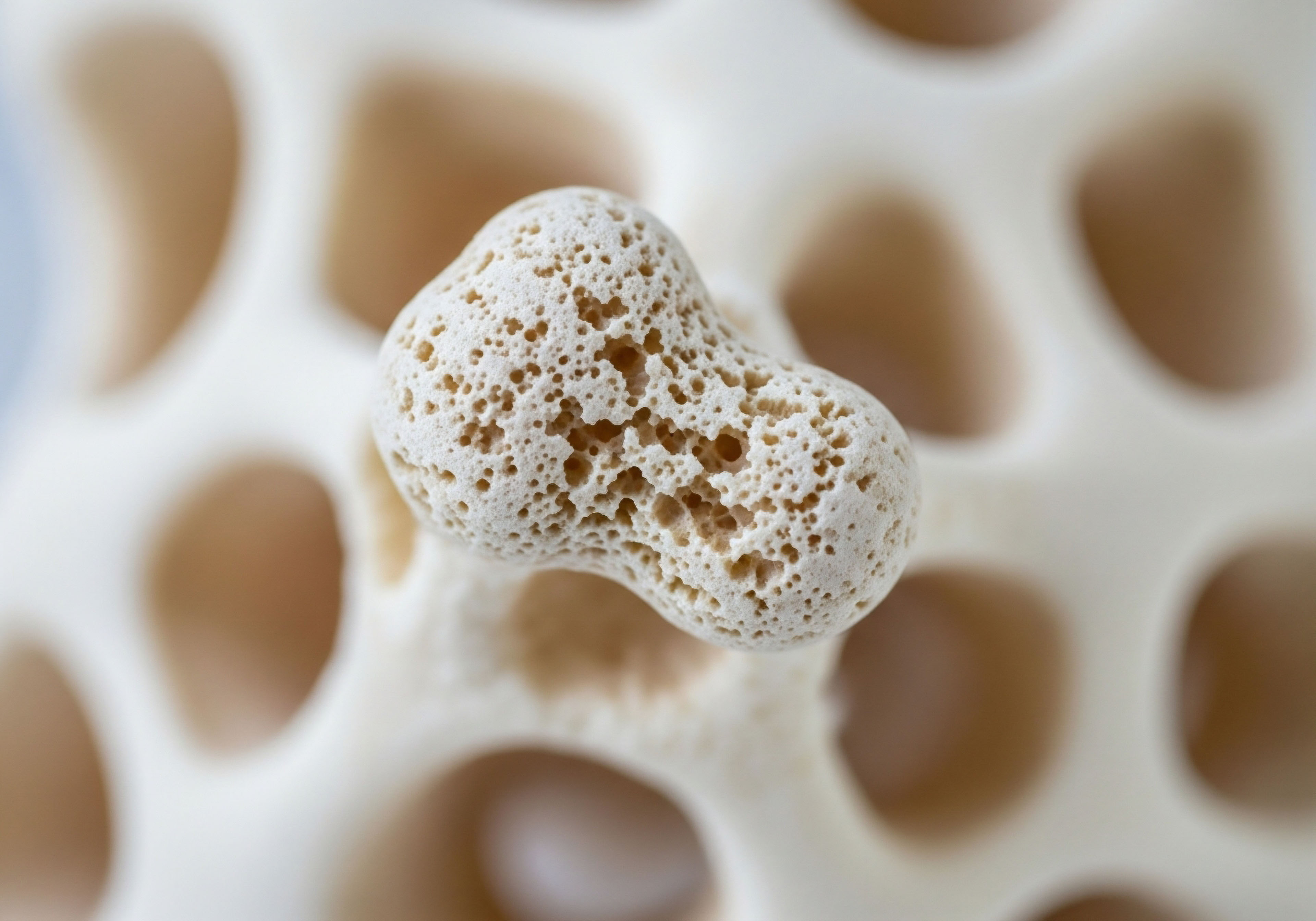

Fundamentals
Your sense of well being is deeply connected to the intricate communication network within your body, a system orchestrated by hormones. When this internal messaging service functions optimally, the result is vitality.
The experience of feeling “off” ∞ a subtle drag in your energy, a shift in your mood, a general decline in your physical prowess ∞ is often a direct reflection of a disruption in this delicate biochemical balance. Understanding the sustained influence of hormonal optimization on your cardiovascular system is a personal journey into the very mechanics of your own life force.
It begins with recognizing that the heart and its vast network of vessels are exquisitely sensitive to the hormonal signals that govern your body’s daily operations.
The conversation about cardiovascular health often revolves around diet and exercise. These are undeniably important pillars. A third, equally significant pillar is your endocrine health. Hormones like testosterone and estrogen are powerful regulators of metabolic function. They influence how your body processes sugars and fats, manage inflammation, and maintain the integrity of your blood vessels.
When these hormone levels decline or become imbalanced with age, the protective mechanisms they provide begin to wane, creating a biological environment where cardiovascular risk factors can accumulate. This is a silent process, one that unfolds over years, often without overt symptoms until a significant issue arises.
A regulated endocrine system provides a foundation for cardiovascular resilience, influencing everything from cholesterol metabolism to arterial health.
Consider the architecture of your blood vessels. Their inner lining, the endothelium, is a dynamic surface that requires constant maintenance. Optimal hormone levels contribute to this maintenance, promoting flexibility and preventing the kind of chronic inflammation that leads to plaque buildup.
When hormones are optimized, they act as systemic guardians, helping to maintain a favorable lipid profile by influencing the balance of cholesterol types and supporting efficient glucose utilization, which in turn reduces strain on the entire cardiovascular apparatus. This is physiology in action, a direct link between your endocrine status and the long-term health of your heart.

The Hormonal Influence on Blood Lipids
The way your body manages cholesterol is a key determinant of cardiovascular wellness. Hormonal optimization directly impacts lipid metabolism. For instance, appropriate levels of testosterone in men can contribute to a reduction in total cholesterol and low-density lipoprotein (LDL) cholesterol, often referred to as “bad” cholesterol.
Similarly, estrogen in women plays a role in maintaining healthy levels of high-density lipoprotein (HDL) cholesterol, the “good” cholesterol that helps clear excess cholesterol from the arteries. A balanced hormonal state fosters an environment where lipids are processed efficiently, preventing their accumulation in ways that could compromise blood flow.

Insulin Sensitivity and Hormonal Health
Insulin is the hormone responsible for ushering glucose from your bloodstream into your cells for energy. When your cells become resistant to insulin’s signal, your body must produce more of it to compensate, leading to a state of chronic high insulin that can damage blood vessels and promote fat storage.
Hormonal optimization can improve insulin sensitivity. Studies have shown that testosterone therapy in men with low levels can lead to a decrease in fasting insulin and an improvement in insulin resistance. This enhanced sensitivity means your body can manage blood sugar more effectively, reducing a significant risk factor for cardiovascular disease.


Intermediate
Advancing from a foundational understanding of hormonal influence to the clinical application of optimization protocols reveals a landscape of targeted interventions designed to restore physiological balance. These protocols are not a one-size-fits-all solution; they are precise, data-driven strategies tailored to an individual’s unique biochemistry, symptoms, and health goals.
The sustained benefits to cardiovascular markers are a direct result of this meticulous recalibration of the endocrine system. By addressing specific hormonal deficiencies, we can systematically improve the metrics that define cardiovascular health, moving beyond prevention to proactive enhancement of function.
For men, the focus often lies in restoring testosterone to an optimal physiological range. Testosterone Replacement Therapy (TRT) is a well-established protocol for this purpose. The standard approach involves weekly intramuscular or subcutaneous injections of Testosterone Cypionate, a bioidentical form of the hormone.
This is often complemented by other medications to ensure a balanced hormonal profile. For instance, Gonadorelin may be used to maintain the body’s own testosterone production and preserve fertility, while an aromatase inhibitor like Anastrozole can be prescribed to manage the conversion of testosterone to estrogen, thereby mitigating potential side effects. This multi-faceted approach ensures that the benefits of testosterone are realized without creating imbalances elsewhere in the system.
Through carefully managed protocols, hormonal optimization aims to re-establish the body’s natural signaling pathways, leading to measurable improvements in cardiovascular risk factors.
In women, hormonal optimization addresses the complex changes that occur during perimenopause and post-menopause. The decline in estrogen and progesterone during this transition can accelerate cardiovascular aging. Hormone therapy for women often involves a combination of hormones to restore a more youthful physiological state.
This might include low-dose Testosterone Cypionate to improve energy, libido, and body composition, along with Progesterone, which plays a protective role in the cardiovascular and reproductive systems. The specific formulation and delivery method, whether it be injections, pellets, or transdermal creams, are selected based on the individual’s needs and preferences. The goal is to alleviate symptoms while simultaneously providing long-term cardiovascular protection.

What Are the Specific Cardiovascular Marker Improvements Seen with TRT?
Clinical evidence demonstrates that well-managed TRT can lead to significant improvements in several key cardiovascular markers. These benefits are a direct consequence of restoring testosterone’s metabolic and anti-inflammatory functions. The table below outlines some of the documented effects of TRT on cardiovascular health indicators.
| Cardiovascular Marker | Effect of Testosterone Replacement Therapy | Clinical Significance |
|---|---|---|
| Lipid Profile | Decreases in total cholesterol, LDL cholesterol, and triglycerides. | Reduces the building blocks of atherosclerotic plaque, improving arterial health. |
| Insulin Sensitivity | Improved glucose uptake and reduced fasting insulin levels. | Lowers the risk of developing metabolic syndrome and type 2 diabetes, both major contributors to cardiovascular disease. |
| Inflammation | Reduction in certain inflammatory markers like C-reactive protein (CRP). | Mitigates the chronic, low-grade inflammation that drives the progression of atherosclerosis. |
| Body Composition | Increased lean muscle mass and decreased visceral fat. | Improves overall metabolic rate and reduces the secretion of inflammatory cytokines from adipose tissue. |

Peptide Therapy a New Frontier in Cardiovascular Optimization
Beyond traditional hormone replacement, peptide therapies represent a sophisticated approach to enhancing cardiovascular and metabolic health. Peptides are short chains of amino acids that act as precise signaling molecules in the body. Growth hormone secretagogues, such as the combination of CJC-1295 and Ipamorelin, are used to stimulate the body’s own production of growth hormone.
This can lead to a cascade of benefits, including improved body composition, enhanced cellular repair, and better sleep quality, all of which indirectly support cardiovascular health. Other peptides, like PT-141, are used for sexual health, while Pentadeca Arginate (PDA) is explored for its potential in tissue repair and inflammation reduction. These therapies offer a highly targeted way to support the body’s innate healing and regenerative capacities.
- CJC-1295 This peptide is a long-acting growth hormone-releasing hormone (GHRH) analogue. It works by stimulating the pituitary gland to release more growth hormone over an extended period.
- Ipamorelin This peptide mimics the action of ghrelin, a hormone that stimulates the release of growth hormone from the pituitary gland. Its action is more targeted than other secretagogues, with less impact on other hormones like cortisol.
- Sermorelin Another GHRH analogue, Sermorelin has a shorter half-life than CJC-1295 and provides a more pulsatile release of growth hormone, mimicking the body’s natural patterns.


Academic
A deeper, more granular examination of hormonal optimization’s cardiovascular benefits requires a shift in perspective from systemic effects to the molecular and cellular mechanisms at play. The sustained improvement in cardiovascular markers is the macroscopic manifestation of intricate biochemical events occurring within the endothelium, the myocardium, and the complex machinery of metabolic regulation.
The scientific literature, when viewed through a systems-biology lens, reveals a profound interconnectedness between the endocrine and cardiovascular systems, where hormones act as pleiotropic signaling molecules with far-reaching effects on gene expression, enzyme activity, and cellular function.
The impact of testosterone on atherosclerosis provides a compelling case study in this mechanistic exploration. Atherosclerosis is fundamentally an inflammatory disease, and testosterone has been shown to exert significant anti-inflammatory effects. It can modulate the expression of cytokines and adhesion molecules that are critical to the recruitment of monocytes to the arterial wall, a key initiating event in plaque formation.
Furthermore, testosterone appears to influence the behavior of macrophages within the plaque itself, potentially promoting a shift from a pro-inflammatory M1 phenotype to an anti-inflammatory M2 phenotype, which is associated with plaque stability and regression. These cellular-level actions are a primary driver of the improvements in lipid profiles and overall cardiovascular risk observed in clinical trials.
The true academic appreciation of hormonal optimization lies in understanding how these molecules interact with cellular receptors and signaling cascades to alter the trajectory of cardiovascular aging.
The role of estrogen in female cardiovascular health offers another layer of complexity. Estrogen’s cardioprotective effects are mediated through its interaction with estrogen receptors (ER-alpha and ER-beta), which are found in various cardiovascular tissues, including endothelial cells, vascular smooth muscle cells, and cardiomyocytes.
The activation of these receptors triggers a cascade of downstream effects, including the upregulation of nitric oxide synthase, which leads to vasodilation and improved blood flow. Estrogen also has direct antioxidant properties and can favorably modulate the renin-angiotensin-aldosterone system, a key regulator of blood pressure. The “timing hypothesis” suggests that the cardiovascular benefits of estrogen replacement are most pronounced when initiated early in menopause, before significant atherosclerotic changes have occurred, highlighting the importance of timely intervention.

How Does Hormonal Optimization Affect Endothelial Function?
Endothelial dysfunction is a sentinel event in the development of cardiovascular disease, characterized by a reduction in the bioavailability of nitric oxide (NO), a critical signaling molecule. Hormonal optimization can directly address this issue. The table below details the mechanisms through which key hormones influence endothelial health.
| Hormone | Mechanism of Action on Endothelium | Resulting Cardiovascular Benefit |
|---|---|---|
| Testosterone | Upregulates endothelial nitric oxide synthase (eNOS) expression and activity, leading to increased NO production. Also exhibits calcium channel blocking properties. | Promotes vasodilation, improves blood flow, and lowers blood pressure. |
| Estrogen | Stimulates eNOS through both genomic and non-genomic pathways via estrogen receptors. Reduces the production of endothelin-1, a potent vasoconstrictor. | Enhances vasodilation, reduces vascular resistance, and maintains arterial flexibility. |
| Growth Hormone | Indirectly improves endothelial function by enhancing insulin sensitivity and reducing visceral adiposity, which in turn lowers systemic inflammation. | Creates a more favorable metabolic environment for endothelial health. |

The Interplay of Hormones and Myocardial Function
The heart muscle itself is a hormonally responsive tissue. The presence of androgen and estrogen receptors on cardiomyocytes indicates that these hormones have direct effects on myocardial structure and function. Testosterone has been shown to have positive inotropic effects, meaning it can increase the force of cardiac contraction.
In the context of heart failure, some studies have suggested that testosterone therapy can improve exercise capacity and quality of life. Growth hormone secretagogues, like Ipamorelin and CJC-1295, have also been investigated for their potential cardioprotective effects.
Research in animal models suggests that these peptides may help to reduce cardiomyocyte apoptosis (programmed cell death) and improve cardiac function in the setting of heart failure. This research opens up new avenues for therapeutic interventions that go beyond simply managing risk factors to actively supporting the health and resilience of the heart muscle itself.
- Genomic Effects Hormones can enter a cell and bind to receptors in the nucleus, directly influencing the transcription of genes related to cardiovascular health. This is a slower, but more sustained, mechanism of action.
- Non-Genomic Effects Hormones can also bind to receptors on the cell membrane, triggering rapid signaling cascades that can have immediate effects on cellular function, such as the production of nitric oxide.
- Systems-Level Integration The full benefit of hormonal optimization is realized when considering the integrated effects across multiple systems. Improved insulin sensitivity, reduced inflammation, and enhanced endothelial function all work synergistically to lower overall cardiovascular risk.

References
- The Effect of Testosterone on Cardiovascular Biomarkers in the Testosterone Trials. The Journal of Clinical Endocrinology & Metabolism, Volume 102, Issue 4, April 2017, Pages 1139 ∞ 1147.
- Does Testosterone Replacement Therapy (TRT) benefit the cardiovascular system? New England Journal of Medicine.
- The Cardiovascular Benefits of Testosterone Treatment ∞ A Comprehensive Review. Biote.
- GH-releasing peptides improve cardiac dysfunction and cachexia and suppress stress-related hormones and cardiomyocyte apoptosis in rats with heart failure. American Journal of Physiology-Endocrinology and Metabolism, Volume 285, Issue 4, October 2003.
- What is the effect of combining CJC-1295 (Growth Hormone Releasing Hormone) and Ipamorelin (Growth Hormone Secretagogue)? Journal of Clinical Endocrinology and Metabolism.
- Post-menopausal Hormone Therapy and Cardiovascular Disease ∞ Lessons from the Women’s Health Initiative. US Cardiology Review, 2005;1(1):1-5.
- The clinical impact of estrogen loss on cardiovascular disease in menopausal females. Frontiers in Cardiovascular Medicine, 2021.
- The Impact of Menopause on Cardiovascular Aging ∞ A Comprehensive Review of Androgen Influences. Cureus, 2023.
- Estrogen-based hormone therapies have favorable long-term effects on heart disease risk. The Menopause Society.
- Cardiovascular benefits to testosterone replacement, study of 83000 veterans finds. European Heart Journal, 2015.

Reflection

Charting Your Own Biological Course
The information presented here offers a map of the intricate biological pathways that connect your hormonal health to your cardiovascular vitality. This knowledge is a powerful tool, yet it is only the beginning of a deeply personal process. Your own health journey is a unique narrative, written in the language of your specific biochemistry and lived experiences.
The path toward sustained wellness is one of proactive engagement, a continuous dialogue between how you feel and what your internal data reveals. Consider this exploration not as a destination, but as the starting point for a more profound conversation with your own body, guided by a commitment to understanding and nurturing the very systems that give you life.



